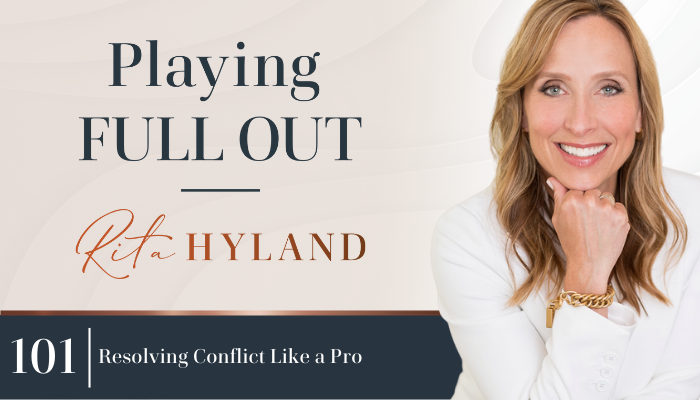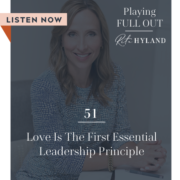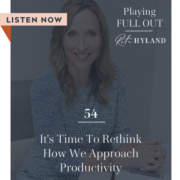Resolving Conflict Like a Pro

Listen to the full podcast episode to learn 3 simple steps to show you how to use anger as a powerful tool and produce transformative, desired outcomes during conflict resolution.
It happens to us all: someone treats us unfairly, our opinion is disregarded, we feel our contributions at work or home are undervalued. Slowly, and sometimes instantly, we become ANGRY. “How dare they!” we think to ourselves. Does this sound like a familiar, maybe even recurring experience for you? If so, I want to show you what you can do when you feel yourself getting angry at someone, how to use anger as a powerful tool, and what to do to transform that anger into positivity, productivity and peace.
A problem we all face in the world today is the presence of tons of reasons to feel triggered and angry.
We can find them in our news, politics, workplaces, communities, and maybe even in our families. Then, when we’re faced with so much anger, we inadvertently become angry, too. But, if all of us are in a triggered state feeling angry, how can we do the work that we need for conflict resolution?
One thing you might not know I do in my work is conflict resolution in relationships. In fact, it’s a lot of what I do whether implicitly or explicitly. I am often called to resolve conflicts between a manager and an employee, partners at a firm, department heads, and even between spouses. In most cases, the hurt, judgment, blame, and anger in these situations is high. It’s common then for both parties to get ensnared by anger. But why? Why is there so much anger?
Our anger is a form of protection for when we feel threatened.
Our body is doing what it is inherently called to do. It triggers our sympathetic nervous system to fight, flee, or freeze in order to save us. Which of these three coping mechanisms we choose is usually determined by what worked for us at a younger point in our lives. When something works for us, we repeat it. Eventually it becomes an automatic response — an immediate reaction that shows up whenever we get angry.
Here’s where the problem shows up – when we react with anger, blame, and indignation, we end up either destroying relationships and opportunities or severely impeding their growth. Anger also comes with a significant cost to our health in the form of anxiety, high blood pressure, and heart attacks – just to name a few.
How can you become better at navigating your anger rather than being sabotaged by it?
Believe it or not, you can learn how to turn anger into positive energy through a proven 3-step emotionally intelligent process. It’s one that differentiates the evolved, self-aware individual and leader from others. Let’s get into the steps.
Be curious. Not furious.
Lead with curiosity. When you’re feeling hurt, try to slow down your reaction. Instead of throwing anger and blame, be curious and begin to ask questions seeking to find something you didn’t know. Did someone cut you off in traffic triggering your road rage? Slow down and curiously ask yourself, “I wonder why he’s driving so fast…” What am I missing? What am I not seeing adequately? What may I not be considering? What else do I need to know here?
When you start by making assumptions, your own preconceived notions about how they are reacting to you are actually influencing how those people react. Believe it or not, you are actually much more in control of the responses you’re getting. If you change your perspective and think about things differently, 9 times out of 10, you’re going to get different responses, reactions, and results.
Assume positive intention.
Especially until you know otherwise. Give the opportunity for someone else to be heard for their intentions and to be seen accurately as opposed to what your primal angry, protective, threatened brain is conjuring up in a moment where it feels under siege.
Choose to connect.
Share something about you with the person you’re angry with that they might not know. Show your humanity. Be emotionally honest. What happens in the Law of Reciprocity is that what we give, someone else wants to respond in kind. So, if you’re choosing to connect, to be human, to be emotionally honest, it’s likely you are going to get the same thing back in return. This is how you begin to have more power over creating peace than you’ve previously recognized or owned.
You can be passionate and defend your position down to the death, but the wisest know when to end the attack and anger and begin to be curious. The wisest know when to see the humanity in the other person, to give them compassion and empathy.
When you’re angry, be sure to discern whether you’re spending your energy wisely or getting caught up in an exhausting spiral of resistance just for the sake of being angry.
Some of the best advice for living an open-hearted life and becoming a conflict resolution master is to remember a quote from Socrates:
True knowledge exists in knowing that you know nothing.
If you choose to operate from this mindset, you’ll find yourself always in a state of being curious. You’ll drop the assumptions that are evoking the negative, undesired behaviors from others. You’ll start asking questions, having more compassion, and naturally engage and connect with others showing them your own humanity.
The bottom line is that anger is not a bad emotion. It is a messenger that is absolutely necessary at times to keep us safe and alive. Too often, however, we believe there are things threatening our existence that really aren’t. Instead, they may simply be threatening our ego or maybe our reputation.
If you find that anger is preventing a deal from going through, a team’s best production, you getting promoted, or a relationship with a family member thriving, begin repeating to yourself the mantra, “Be curious, not furious.” Your results will change each and every time. You’ll also improve your status as a leader, parent, spouse, and friend.
In this episode I share:
- Real-world examples of how anger triggers us and leads us to immediately react in destructive ways
- What anger really is and why it’s important in our lives
- My go-to transformational 3-step process to shift your immediate reaction to anger into a mindful state of curiosity that turns around conflict and creates positive, desired outcomes
- The emotionally intelligent behavior that differentiates evolved, self-aware individuals and leaders from angry individuals who unwittingly sabotage and destroy relationships and opportunities
Resources and related episodes:
- If you’d like to be notified of when new podcast episodes are released, you can do so here: Playing Full Out
- Learn more about the Inside Out Method
- Connect with Rita on LinkedIn.
Subscribe on Apple Podcasts for more tips, tools, and inspiration to leading the optimal vision of your life, love, and leadership. Remember, a half version of you is not enough. The world needs the fullest version of you at play.
___
About Rita Hyland
With over 20 years of experience as an executive and leadership coach, Rita helps leaders — emerging and established — excel in corporate and entrepreneurial environments.
Rita believes if leaders were more clear about how transformation really works and more intentional about creating what they want, their impact, success, and influence in the world would be unstoppable.
Through her coaching programs, private coaching, and masterminds, Rita shows leaders how to win consistently and create the impact and legacy they desire.
Central to Rita’s work is the understanding that you will never outperform your current programming, no matter how strong your willpower.
When you learn to use Rita’s proprietary Neuroleadership Growth Code, a technology which uses the best of neuroscience and transformational psychology to hit the brain’s buttons for change, YOU become both the solution and the strategy.
Her mission is to end talented, hard-working, and self-aware leaders spending another day stuck in self-doubt or confusion and not contributing their brilliant work and talent the world so desperately needs.









Leave a Reply
Want to join the discussion?Feel free to contribute!